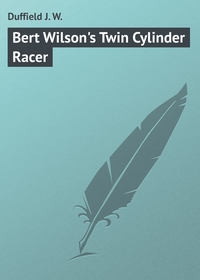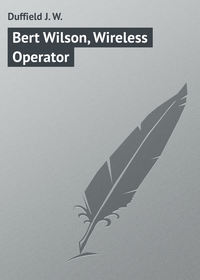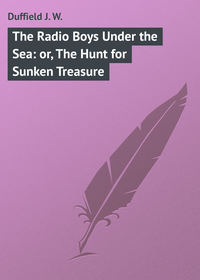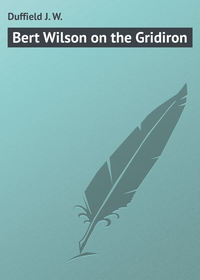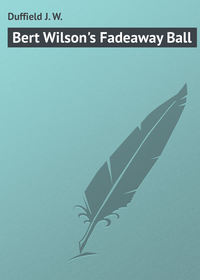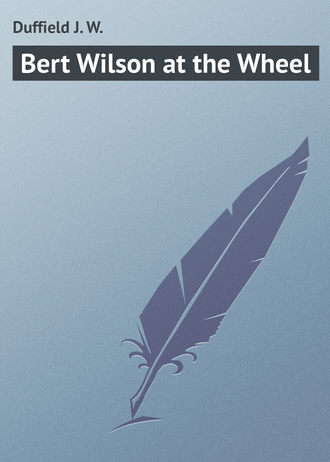 полная версия
полная версияBert Wilson at the Wheel
Of course, there was no sleep after that for the other fellows, and, bath and dressing and breakfast dispatched as soon as possible, the three boys, seated in their beloved auto, and bidding a noisy good by to the rest of the camp, sped away on their quest for trout enough for a rousing fish dinner that evening.
You would have had to go a long way to find a merrier or more care-free set of boys than our three adventurers. Used as they were, by this time, to the automobile, it never became an old story to them, and now, as the swift motion of the car sent the cool air rushing against their young faces, with the sunshine turning everything to gold, and with the prospect of a day of rare sport before them, they gave full vent to their overflowing spirits. They shouted and laughed, and chaffed each other until many a staid farmer or farm hand, starting early work in the fields, or doing chores about the barns, found themselves smiling in sympathy. They recalled the time when they were boys, and the whole world just a place to be happy and jolly in.
The boys had enjoyed the ride so much, that all three were almost sorry when Tom pointed out the gleam of water through the trees, and they knew that Red River was at hand; but in a moment nothing was thought of but the fun of getting ready for their day’s sport.
Tumbling out of the “Red Scout,” laden with fishing baskets and tackle and rods, they raced down to the river bank, selected each a shady, grassy, comfortable spot, and, line and reel and hook adjusted, were obliged at last to curb their wild spirits, still their noisy chatter, and settle down to fisherman’s quiet, although irrepressible Tom, unable to subside at once, sang softly:
“Hush, hush, not a breath, not a breath,I’ve a nibble, still as death, still as death.”The others could not resist joining in the chorus of the old song, and regardless of consequences sang lustily:
“Oh, the joys of angling!Oh, the joys of angling!Oh, the joys, oh, the joys,The joys, the joys of angling.”Then a Sabbath stillness descended on the party, until Ben shouted, “first bite,” and giving his line a sudden jerk and swing, landed a beautiful speckled trout upon the grass a few feet away.
For a few moments excitement reigned, and cries of “Hurrah for Ben,” “good for us,” “isn’t he a beauty?” “let’s keep it up,” were heard, until Bert’s “We certainly won’t keep it up unless we keep quiet,” sent them back to their places and again quiet reigned.
Ten, fifteen, twenty minutes went by, and there were no more nibbles. The boys were beginning to get restless, when Bert landed the second fish, and, a couple of minutes after re-baiting his hook, added a third beauty to their collection.
Tom, seeing the success of his comrades, began to feel as though he were being left on the outside of things, but Bert encouraged him by reminding him, “First the worst, second the same, last the best of all the game,” and sure enough, after nearly half an hour of most trying waiting, he suddenly felt his line twitch, and had the joy of landing the largest and finest fish yet caught.
When the excitement had a little subsided, Ben said, “I think we ought to celebrate that dandy catch, and the very finest way would be to have a feast.”
As, what with the stirring ride and the excitement of the sport, each fellow felt, with Bert, that he was hungry enough to “eat nails,” the hamper was brought from the “Red Scout” and unpacked with scant ceremony.
Every boy who has spent a day in the open will know exactly how good those cold chicken and ham sandwiches tasted; and the way the doughnuts vanished was something to see. Washed down with a drink of cool water from a nearby spring, it was a luncheon to be remembered.
Again settling themselves in their chosen places, they continued to try “the heedless finny tribe to catch”; for four trout, even though they were fine, large ones, would, Tom said, regardless of the aptness of his simile, be no more than “a drop in the bucket for all those hungry fellows”; but their luck seemed to have changed.
For more than two hours not a nibble disturbed the quiet of those exasperating lines, and, as the ground, although covered with springy grass, is not the softest seat in the world, the boys’ patience was tested to the utmost. They lay outstretched, resting on both elbows, and Tom, tempted by the heat and the absolute quiet, was just falling into a doze, when he was aroused to immediate action by the violent twitching of his line. A moment more, and another speckled victim was added to their store.
For the next hour and a half the fish bit almost as fast as they could bait their hooks, and they were kept busy hauling in one after another, until, in the joy and excitement of the sport, they lost all count of time. Fortunately for the camp, Bert suddenly made the double discovery that they had more than enough fish, and that if there was to be a fish dinner at camp that night, they would have to stop at once.
“We’ll have to make a quick sneak,” said Ben, who, in moments of excitement, sometimes forgot his most polished English.
Hastily packing their catch in the fishing baskets they had brought, they tossed them and the tackle into the auto, scrambled in themselves, and were off and away.
“The ‘Red Scout’ goes fine,” said Tom, as the great car gathered headway. From the beginning, the auto race, which even the wonderful day’s sport could not completely banish from their minds, had been the almost exclusive topic of conversation among the campers, and now that the day was rapidly drawing near, they could think of little else. “Is she in first-class condition, Bert?” asked Ben.
“Yes,” Bert replied, “except that I noticed on the way out this morning that the brake did not work as well as usual. As soon as we reach home I will find and remedy the trouble, whatever it is. If worst comes to worst I can send to the factory for a new part, which would reach us inside of twenty-four hours.”
By this time about half the ten mile stretch had been covered, and now they had begun to descend a very steep hill. Suddenly Bert’s face went white. Tom, chancing to look at him, exclaimed, “What’s the matter, Bert?” and Bert replied, “The brake won’t work, fellows. Something’s stuck. I can’t control the car.”
Then for a moment all yielded to a panic of fear. “Oh, Bert,” said Ben, “you must stop her.” “There must be something you can do,” begged Tom.
Looking into the frightened faces of his two companions, Bert recovered his self-control, and resolved to do his best to avert an accident. “Don’t be frightened, fellows,” he said. “The steering gear is all right. Just sit tight and keep a stiff upper lip, and we’ll come through.”
“But, Bert, the bridge!” gasped Tom, and at the same moment a vision of the narrow bridge, scarcely wide enough for two autos to pass, which crossed the river at the foot of the steep hill, and just where the stream was deepest, flashed before their eyes. All realized that should the automobile fail to pass over the center of the bridge, and should strike the frail railing on either side – Well, they didn’t dare to think of that.
Calling up all their courage, the brave boys resolved to face, without flinching, whatever awaited them. Once past the bridge and onto the broad roadway beyond, they knew that they would be safe. On level ground, with the power shut off, they would come to a standstill.
But “would they ever reach that level roadway?” each boy asked himself, with sinking heart.
Bert renewed his efforts to use the worthless brake, but without avail. Down, down, they flew, gaining speed with every passing moment, and now the bridge was in sight. Another moment, and they would be upon it.
“Courage, fellows,” said Bert, in low, tense tones, and bracing himself, he concentrated all his mind and energy in guiding the car to the center of the bridge.
When a few hundred feet away the forward wheel struck a large stone, and the machine, which had been headed directly for the bridge, swerved to one side, and now sped onward toward the river.
With lightning-like rapidity Bert wrenched the steering wheel around, and once more, with only a few feet of space to spare, the “Red Scout” – good old “Red Scout,” was headed almost for the middle of the bridge – not quite – the space had been too small. To the boys, looking ahead with straining, despairing eyes, it seemed that they must crash into the railing, and that nothing could save them.
Instinctively they closed their eyes, as the car dashed upon the bridge, expecting each minute to hear the crash of breaking timbers, and to feel themselves falling into the engulfing waters of the rushing river.
But the expected did not happen. Like a bird the “Red Scout” skimmed over the bridge, missing the railing by a hair’s breadth, and was out upon the broad roadway. Almost before the boys could realize their escape from the awful danger that had threatened them, it was over, and the “Red Scout” gradually losing its speed, at last stood still.
Breathless, speechless, dazed, almost overcome, the boys sat looking at each other for a few moments, until, the full realization of their wonderful escape coming upon them, they grasped each other’s hands convulsively. Each knew that in the other’s heart, none the less earnest for being unexpressed, was a fervent prayer of thankfulness for their deliverance; but as speech returned to them, the first words uttered by Tom, were, “What do you think of that for classy driving, fellows?” at which they all laughed nervously.
Their laugh did not last long, however, for in the midst of it, out from among the trees and shrubbery that skirted the roadway emerged two rural constables. As if one overwhelming experience were not enough, the constables informed them that they were arrested for exceeding the speed limit.
Bert was the first to recover from the shock, and giving his companions a comical, but reassuring look, he stepped forward and said, “We have been speeding some, officers, but we simply couldn’t help it,” and he proceeded to explain. But the boys’ faces expressed their consternation when they found that their explanation was not credited.
“We only have your word for that,” said one of the men, “and you will have to convince the judge that you are telling the truth.”
“Why, you certainly won’t arrest us for an accident to our brake, for which we are not at all to blame!” cried Tom, indignantly.
“Well,” said one constable, giving his fellow a knowing wink, “perhaps if you have a ‘tenner’ that you have no use for, we might forget all about it.”
Bert, flushed and indignant, refused, and without further protest, the three boys, followed by the two constables, took their places in the car. As they were only a short distance from town, they soon arrived at the court house, and were left in an ante room to await their turn for a hearing.
Once alone, the three comrades stood for the second time within an hour, looking into each other’s faces. As Tom afterwards said, “too full for utterance.”
Suddenly Ben began strutting around the room in a most pompous manner, remarking, “I guess you don’t know who we are. You know,” said he, “that one is not a howling swell until he has been pinched for speeding, so behold us three aristocrats!” with another strut across the room.
The boys could not help laughing, but Bert said, “Well, if this is being an aristocrat, I’d rather be excused. It won’t be quite such a laughing matter if we find ourselves fined fifty or a hundred dollars.”
“But,” began Tom, and said no more, for at that moment they were called before the judge.
They were obliged to stand by and hear the constable’s charge against them, given in detail. Then the judge turned to them —
“What are your names?” was the first question.
Bert replied for the three. Upon hearing the names the magistrate started, and looked keenly at them, but said nothing further than to ask what they had to say to the charge brought against them. Bert gave a clear and connected account of the accident to the auto brake, and its consequences, and ended by saying, that if any proof were needed, an examination of the brake would show the truth of their account.
The judge accepted the boy’s statement, dismissed the charge against them, and turned to them a face from which all sternness had vanished, and been replaced by such a genial, friendly smile, that the three comrades were filled with wonderment. This was not lessened when the magistrate asked them if they were the three brave fellows who had stopped the two runaways a few days before, and saved the lives of the ladies who were driving.
With amazement that the judge should know of the runaway, plainly written on their faces, the boys acknowledged that they had stopped the horses, but added that it was their auto that had frightened the animals, and so it had plainly been up to them to help.
The magistrate smiled more broadly at this, but repeated that they were brave boys, and that he was glad to meet them.
Looking quizzically at them, he said: “I have a special interest in those two ladies. One of them is my wife, and the other my daughter, and I can never repay you for what you have done for me. You have made me your debtor for life. If I can ever do anything for you, be sure and let me know.”
Another handshake all around, and the boys found themselves free once more. Were they happy? – well, you should have seen them as they climbed into the car and headed toward camp.
Events had so crowded upon each other that for the first mile or so the three speeders sat silently reviewing the occurrences of this most amazing day. And Tom, recalling their court room experience, broke out with:
“Gee whiz, I’m glad I’m freeNo prison cell for me.”This provoked a laugh and broke the tension, and a moment afterward a scouting party from the camp hailed them boisterously: “Where are those fish?” “How long do you think we can live without eating?” “Stand and deliver or take the consequences” – and as the auto came to a standstill, the basket was snatched and hurried off to the mess tent. Soon a delicious odor made every hungry boy’s mouth water, and when at last they gathered around the table it was with wolfish appetites that they paid their respects to that belated fish dinner.
CHAPTER XVII
Biddy Harrigan Remembers
“Cast thy bread – cast thy bread upon the waters,
“And it shall return – it shall return unto thee after many days,” chanted a clear, high voice, truly a wonderful voice, which Bert claimed as his own discovery.
It was almost bed-time in the camp. The day had been a most fatiguing one, and all had returned so weary that no one cared for the usual lively evening entertainment. Even Mr. Hollis had said that he was “dog-tired,” and he felt with the boys that the very finest thing in the world was just stretching out on the grass, resting weary feet, and saying to one’s self: “Nothing to do till tomorrow.”
It was a perfect evening, cool and quiet. There was no moon, but the stars twinkled brightly, and the boys had been looking up at them and trying to make out some of the six constellations that everyone should be familiar with. But even that, in their present state of laziness, was too much like work, and now they lay doing and almost thinking nothing.
Even Don, the big collie, that the tramps had deserted, was not inclined to romp with the boys as usual, but lay quietly with his great head resting upon his paws. He had become the pet and plaything of the whole camp and treated them all impartially except Bert whom he had chosen as his one particular master. He wanted no other heaven than this – to lie, as now, close to Bert, whose hand caressed his head while he said now and again: “Good dog”; “Good old fellow!” Don, like the boys, was at peace with all the world.
Suddenly, someone started a popular air in which all joined. This put them in a musical humor, and song followed song, changing after a while from popular music and rollicking college songs to those of a more sentimental nature. Most of the boys had good voices. With the soprano of some, the tenors of the older fellows and Mr. Hollis’ fine bass, the camp singing would have delighted any lover of music.
Whenever the boys had sung together, they had noticed that Phil’s voice had never joined in with the others. They had guyed him about it but as he would never answer them, they had come to the conclusion that he could not sing and was sensitive about it, so they had stopped teasing him.
To-night, as the notes of “The Soldier’s Farewell” floated over the camp, Bert noticed that Shorty was singing for the first time, and though his voice was low as though he were purposely holding it back, for fear the attention of the boys might be drawn to it, the notes were remarkably clear and pure.
When the song ended, Bert turned to Phil and asked him if he liked music. Phil answered that he loved it and added more as if he were thinking aloud than talking, that it was “the finest thing on earth.”
The boys sat up and stared. There was a moment of surprised silence and then a chorus of voices:
“Then you can sing?”
“We never dreamed you could.”
“Why didn’t you tell us?”
“Why wouldn’t you sing for us?”
“Because,” said Phil, who had decided to tell them the real reason at last, “because all you big fellows thought that just because I was small, I couldn’t do anything worth while, and I was sore.”
The fellows expressed their regret and then in responses to a few kindly questions put by Mr. Hollis, they learned that Shorty’s ambition was to obtain a thorough musical education. They learned too that for two years past he had been the soloist in the boy choir of one of the prominent churches in New York. He had joined the boy choir because there he could gain, without cost, a knowledge of sight reading and voice control.
Bert’s “Won’t you sing something for us, Phil?” was not to be resisted and after a moment’s thought his clear notes rose in a burst of melody:
“Cast thy bread upon the waters” —The boys fairly held their breath as the flutelike notes of one of the finest voices they had ever heard, floated off into the woodland spaces.
When he had finished, every one sat spellbound, paying the highest tribute of a moment of perfect silence. Even when the silence was broken by hearty hand clapping, the spell of the music still brooded over them. It had been too fine for noisy applause.
The boys’ appreciation of his singing was very grateful to Phil, and not the least tribute was Tom’s: “Gee, Phil, I hope the birds didn’t wake up to hear that. They would have been green with envy.”
The tension was broken by Sam’s asking: “What does that mean, ‘Cast thy bread upon the waters’ – and how can it return?” Mr. Hollis was glad to explain that no kind deed or word is ever wasted, but is sure to return blessings on the one who gave it, if only in the glow that a kind action always brings.
But, uplifted as the boys had been, it is not in boy nature to stay long upon the heights and they soon came down to earth again.
Jim showed how fully he had come back to earth by remarking as he suddenly remembered that owing to a miscalculation as to the elastic nature of a boy’s capacity, both flour and corn meal had given out, and that in consequence, nothing in the shape of bread had come their way that night: “I wish some real bread were coming tomorrow. I am not particular about its coming by water. It can get here any old way, as long as it comes.”
The sound of someone approaching the camp aroused them. Irish Kitty appeared, with a big basket on one arm and a great bunch of red roses in her apron.
As soon as the boys saw the flowers, a shout went up: “Roses! roses! What beauties!” and on Kitty saying that she had counted them and there was one for each, they were seized upon and distributed in a twinkling.
Now, Kitty stated that she had a “prisint for the young gintlemin” from her mother, Mrs. Harrigan, “to thank thim for the foine illigant ride in the artymobile.”
The big basket was uncovered and there lay revealed to the eyes of the delighted boys a number of large loaves of delicious homemade bread. One did not need to taste that bread to know its value. The firm white loaves spoke for themselves. Corn bread they had in plenty every day, but white wheat flour bread was not included in their regular camp rations, so that this was indeed a treat. They were all devouring it already in imagination, and each wished it were morning so that they might begin in reality.
Kitty departed amid “Good nights” and hearty thanks to her mother, and, camp bed time having arrived, all drifted toward their tents, Tom gaily singing:
“‘Tis a nameThat no shameHas iver been connected withHarrigan! That’s me.”All at once some one shouted: “Look at Ben Cooper.” They turned to see Ben standing like a statue, eyes fixed on nothing, staring straight ahead of him.
“Say, fellows,” said he, “that bread that we cast on the waters on our way home from the doctor’s the other day sure did come back, didn’t it?”
“It certainly did and it didn’t take ‘many days’ either to get here,” said Tom.
“And,” chimed in Shorty, “a big bunch of red roses thrown in, too.”
“Yes, Caruso,” added Bert, throwing his arm affectionately over Phil’s shoulder, “you must be a prophet as well as a singer.”
Very soon the tired boys were off to dreamland, where visions of loaves of fluffy white bread, each loaf with a red rose growing out of it, floated about, and imaginative Dave dreamed that old Biddy made a “prisint” of a loaf to each one, singing in a high cracked voice as she handed them around: “Harrigan! That’s me!”
CHAPTER XVIII
The Race
“Well,” exclaimed Bert, drawing a long breath as he rose from his cramped position beside the “Red Scout,” “this machine is in as good condition as I know how to put it, and if nothing happens I guess we can show you fellows some speed this afternoon.”
It was the morning of the long wished-for race and Bert was addressing an excited group of boys, who were holding wrenches, oil cans, and such other appliances as he might need in putting the finishing touches on the pampered machine. The whole camp was in a ferment of excitement and expectancy, and many were the heartfelt wishes for Bert’s success.
To these boys it seemed the most important thing on earth that their machine should win, and it is safe to say that if Bert had wanted to remove a piece of black grease from the car and had not a cloth handy, any one of them would have sacrificed his best handkerchief without a moment’s hesitation, and been glad to do it.
Fortunately, such a contingency did not arise, however, and finally the last nut had been tightened and the last fine adjustment made, and everything was ready for the start.
The race was scheduled to start at two o’clock, but as the boys had to walk to the track, and this necessitated a long detour around the lake, they started almost immediately after breakfast, so as to get there in plenty of time.
The boys in the two rival camps were not the only persons interested in the race by any means. News of it had leaked out over the surrounding countryside during the week between the completion of arrangements and the actual race, and now there promised to be a goodly attendance of farmers and their families.
Considerable interest was taken in the camp by the kindly country folk, and now the boys were surprised at the number of carriages and farm wagons, full of jolly youngsters, that they met on their march.
Every one they met shouted cheery greetings to them, which they returned with interest. It made them very happy to see the interest taken in them by the farmers, and the very evident good will expressed by them. They didn’t take the trouble to figure out the reason for this, but it was not very hard to find. The fact is, the boys were so manly and well-behaved that they won their way into all hearts.
Many a time they had seen the boys stop their machine rather than frighten a skittish horse, and more than one weary farmer had been given a lift on his way home from some distant field.
So, as has been said, the boys were greeted with expressions of good will on every side as they marched along, and it made them realize, perhaps more than anything else could, that it paid to live a manly, upright life.


